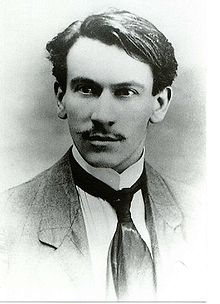This article includes a list of general references, but it lacks sufficient corresponding inline citations. (June 2018) |
Louis Pergaud | |
|---|---|
 Louis Pergaud | |
| Born | 22 January 1882 Belmont, Doubs, France |
| Died | 8 April 1915 (aged 33) Marchéville-en-Woëvre, France |
Louis Pergaud (French pronunciation: [lwi pɛʁɡo]; 22 January 1882 – 8 April 1915) was a French novelist, war poet, and soldier, whose principal works were known as "Animal Stories" due to his featuring animals of the Franche-Comté in lead roles. His most notable work was the novel La Guerre des boutons (1912) (English: The War of the Buttons). It has been reprinted more than 30 times, and is included on the French high-school curriculum.[1]
A village schoolteacher by profession, Pergaud came into conflict with Roman Catholic clergy and laity because of his orders to instill the ideology favoured by the Third French Republic, which owed more to the anti-religious currents of the Age of Enlightenment than to the values being instilled at home by his pupils' parents. In 1907, Pergaud gave up permanently on teaching and moved to Paris to pursue a literary career. Pergaud's prose works are often considered to reflect the influences of Realist, Decadent and Symbolist movements. During the First World War, he was serving with the French Army near Marchéville-en-Woëvre when he was wounded in action in no man's land, eventually rescued by German medical personnel, and taken to a field hospital behind German lines. On 8 April 1915, he was killed at age 33 by friendly fire, when French artillery deliberately shelled and destroyed the hospital where he was being treated.
The War of the Buttons has been adapted five times as a film, four times in French productions and once in an Irish one. It was adapted most recently in France in two films released the same week in September 2011. Both were set during the twentieth century.
- ^ Tobias Grey, "Waging War(s) of the Buttons in France", Wall Street Journal, 15 September 2011, accessed 2 November 2012